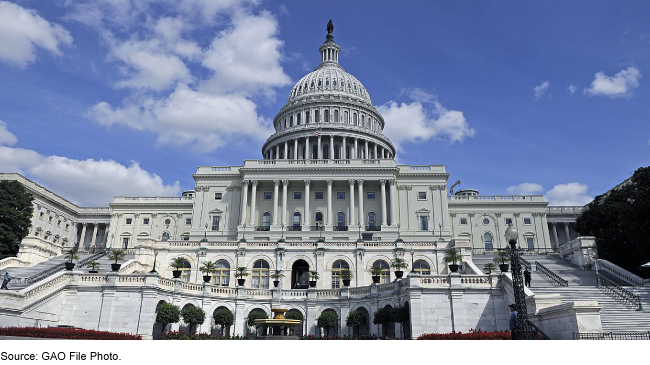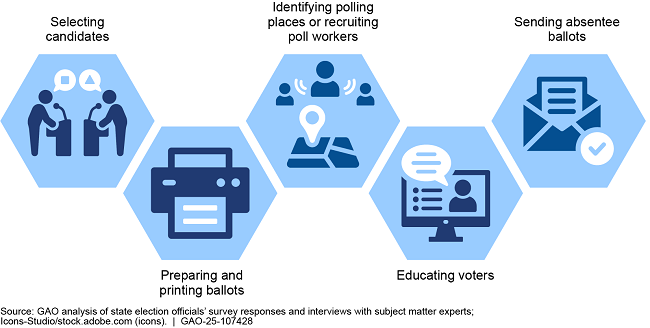Elections: Observations on State Laws and Perspectives on Holding Special Elections to Fill House Vacancies
Fast Facts
In recent years, threats against members of Congress have increased. This has raised questions about states' ability to fill vacancies in the U.S. House of Representatives.
If the Speaker of the House announces there are more than 100 vacancies, federal law generally requires states to hold special elections within 49 days. For this Q&A, we analyzed state laws and surveyed election officials from all 50 states to gather perspectives on holding such elections.
We found that about half who responded were unaware of this federal law. However, a number of officials noted that they believed they could hold special elections consistent with the law.

Highlights
What GAO Found
The U.S. Constitution requires each state's governor to issue written orders for special elections to fill vacancies in the U.S. House of Representatives (House). Following the terrorist attacks on September 11, 2001, a federal law was enacted in 2005 that generally requires states to hold special elections within 49 days of the Speaker of the House announcing that there are more than 100 vacancies in the House. Under the statute, this is referred to as "extraordinary circumstances."
While almost all states have laws for holding special elections to fill House vacancies in general, GAO identified nine states that have laws for holding such elections in extraordinary circumstances, consistent with the federal law. The laws in these states adopt aspects of the federal law, including those related to the 49-day time frame, although most of them do not adopt all the law's requirements. The other 41 states do not have laws that adopt aspects of the federal law, and their laws for holding special elections to fill House vacancies vary in the types of timing provisions they contain. Examples of the timing provisions for holding such elections include specifying the number of days within which states are required to hold the election or giving the governor discretion to order an election within a specific time frame. In the case of extraordinary circumstances, states must follow the provisions of the federal law regardless of whether their laws adopt aspects of that law.
GAO surveyed state election officials in all 50 states to obtain their perspectives on holding special elections consistent with the federal law. Nineteen of the 33 officials who responded reported that they were not aware of the federal law prior to hearing about GAO's study. In addition, officials identified a range of challenges related to holding special elections consistent with the federal law. For example, officials reported that selecting candidates through primary elections in time to hold a special election within the 49-day time frame in the law would be difficult.
Examples of Challenges that States Might Face in Holding Special Elections in Extraordinary Circumstances

State election officials reported that the challenges they identified could affect the accuracy and availability of ballots, pamphlets, and other voting materials; public perceptions of the election; and voting access, such as whether voters have sufficient time to request absentee ballots. However, a number of officials noted that they believed they could hold special elections consistent with the federal law. Additionally, officials identified state practices that might help them hold such elections. For example, officials reported that in some cases states assign responsibility for candidate selection to political parties and noted that this could be done relatively quickly under a special election.
Why GAO Did This Study
GAO was asked to examine state capabilities to hold special elections to fill House vacancies in extraordinary circumstances, consistent with the federal law. This report provides information on (1) state laws related to holding special elections to fill House vacancies and (2) the perspectives of state election officials on the capabilities of, and challenges facing, states in holding special elections to fill House vacancies consistent with the federal law.
To conduct this work, GAO analyzed laws in all 50 states related to holding special elections to fill House vacancies. In addition, GAO conducted a web survey of state election officials in all 50 states to obtain their perspectives on holding special elections consistent with the federal law. To encourage responses, GAO followed up multiple times with non-respondents by both phone and email. Thirty-three states responded to the survey. GAO also reviewed relevant reports and interviewed subject matter experts from four organizations, selected based on their work on this topic.
For more information, contact Rebecca Gambler, Director, Homeland Security and Justice, at (202) 512-8777 or gamblerr@gao.gov;
